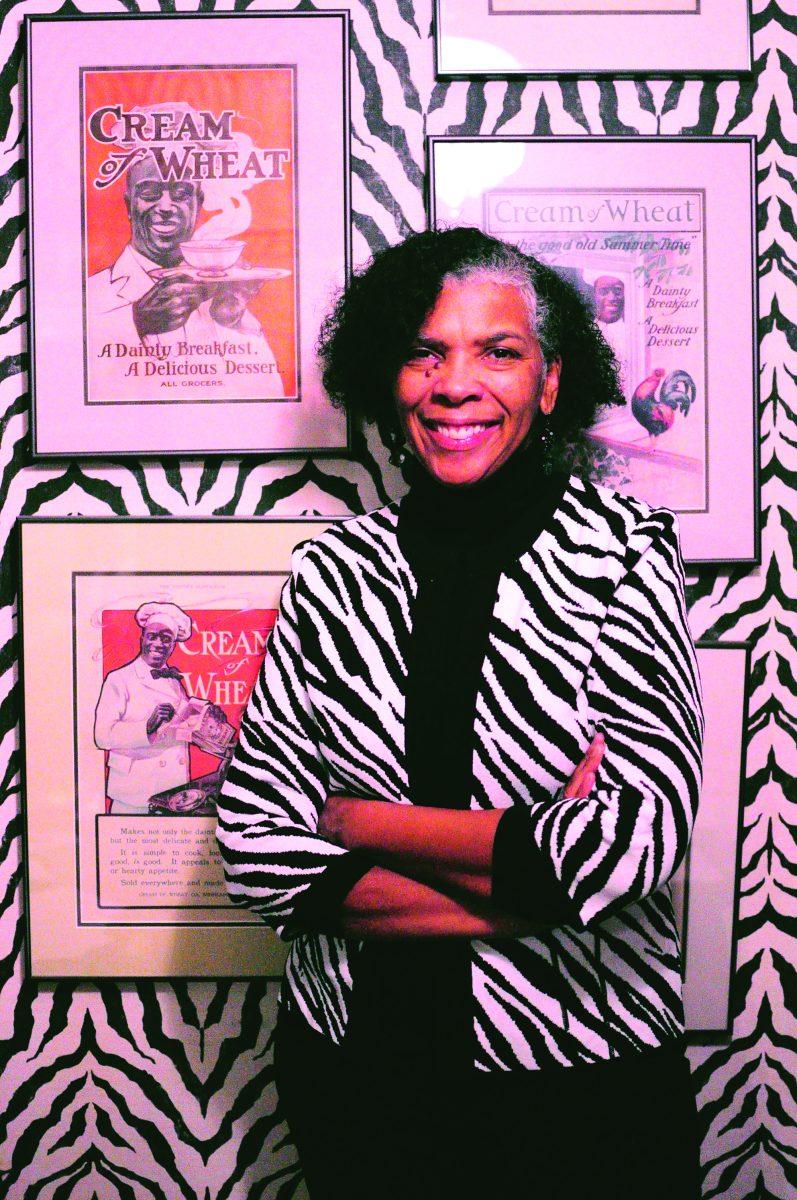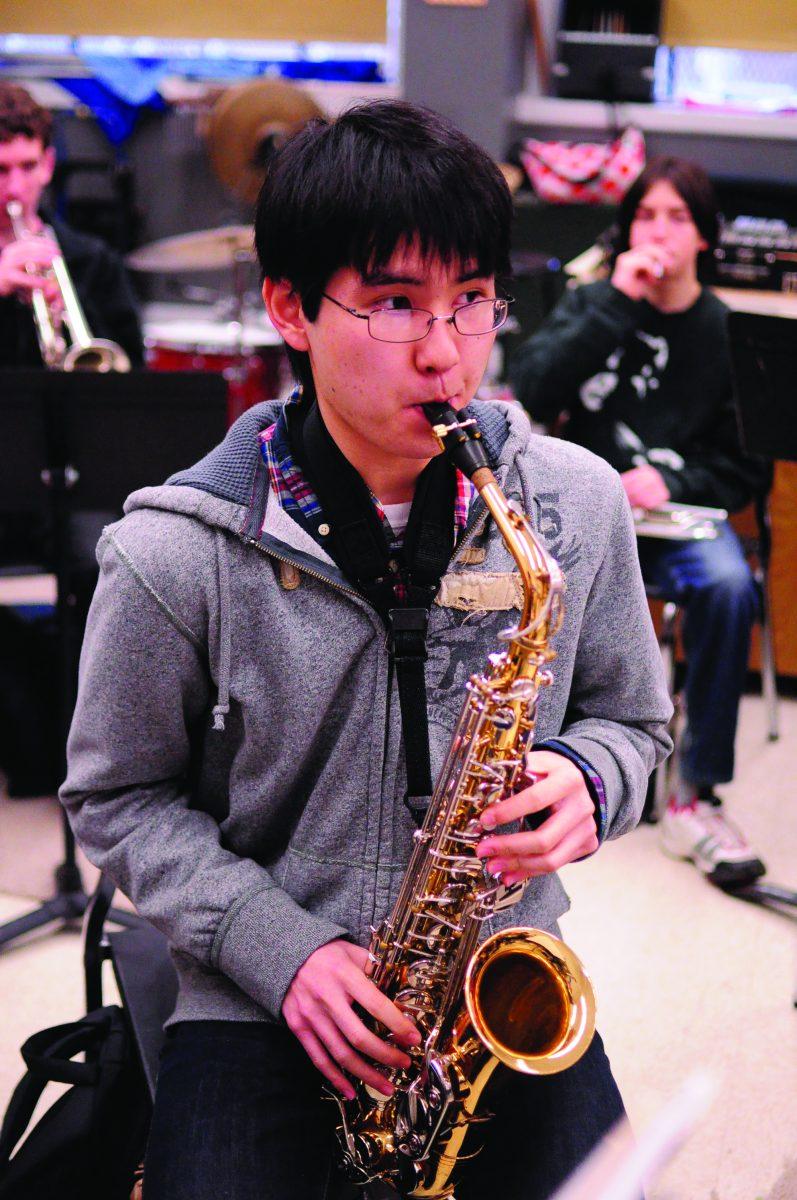Renee Anderson asks a question to the class during her geometry class. No one has an answer. Everyone simply stares at her blankly until she decides to call on someone. Herself.
Only it’s not Anderson, the teacher. It’s Anderson pretending to be a student, complete with high-pitched voice, a sly smile and sitting cross-legged in her classroom chair.
Anderson, the student, quickly solves the equation. Acting aside, her antics draw attention from students. “I like her teaching style,” says senior Ryan McKinley. “It’s different because she presents the math material a lot differently.”
Not knowing how to do a math problem is one thing. But don’t get caught texting, falling asleep or messing around in class after Anderson has warned you. She’s been known to grab her spray bottle full of water, briskly walk over to a student and shower him or her.
“Squirting is a better alternative to referrals or sending people out because when she does that the student won’t be in the classroom learning,” freshman Cade May says.
Anderson’s has a passion for making sure students, especially African-Americans, understand the complexities of math. For years, she has pushed the achievement envelope for black students. Why? Because the latest statistics show there’s tremendous room for improvement when it comes to test scores.
According to the latest statistics for students at Grant, about 72 percent of black sophomores failed to meet state benchmarks in math. But if Anderson has anything to say about it, those numbers will change. And she won’t stop pushing.
“We have lost our drive,” Anderson says. “I came up in the time when Martin Luther King, Jr. was killed, so we have all these people fighting for our education and more access to things. Instead of realizing people fought for us to be able to do this, students blow it off and don’t take it seriously.”
Her drive is fueled by her upbringing in San Francisco and her experience dealing with a few teachers who mistreated her because of her race. Anderson was born Renee Wilkerson in 1952, the second of six children. Her oldest sister was out of the house and away at college, so much of the upbringing of the remaining four children fell to Anderson.
She woke her siblings at 6 a.m. each morning, made sure everyone had breakfast and then she’d comb her younger sisters’ hair. Once everyone was off to school, Anderson had to hustle to catch the bus.
“I usually ended up missing the bus so I had to walk to school,” Anderson recalls. “Everybody comes home from school, everyone has a snack and by then my mother is home. I would help cook dinner and then after dinner we would do homework at the kitchen table and we all would help each other.” Anderson grew up during a time when African-Americans were struggling just to pursue basic education. There were times when she thought she couldn’t learn advanced math but she persevered. Nothing was going to stop her from becoming a math teacher.
Not even blatant racism.
She remembers a time in fifth grade when black students were bussed outside of their neighborhoods to other schools to integrate them. She was one of two black students in her class and the teacher openly called them “nigger.” The teacher made the two sit in the back of the class with a group of students who had learning disabilities.
“I remember very vividly reading something (in class) about slavery,” Anderson recalls. “And she said, ‘That’s all those monkey niggers are good for anyway.’”
Anderson not only had to deal with racism at school. She also faced it in her own neighborhood. In high school, she had moved in with her grandparents who lived in a predominately white area.
“When the community realized our family was black, our real-estate agent came and offered us money,” Anderson said. “The neighborhood got together and raised a lot of money to buy out our house because they didn’t want any African Americans living in their neighborhood.”
Back at school, teachers continued to challenge Anderson. One math teacher tormented her with physical force.
“She would stand by your desk and trace the number four with her ruler in the air and by the time the ruler hit the table, if you had not foiled or factored by then you would get hit on the hand,” Anderson says. “I got hit on the hand one time and after that never again. I told my sister, ‘I want you to drill me on every problem in the book.’ There will not be a chapter in this book that she can ask me that I will not know how to do.”
Anderson relied on her grandfather’s experience to get her through school. Enoch Cole grew up in segregated Sheffield, Alabama, and had to overcome great obstacles to educate himself.
He worked in a library and the librarian taught him to read, but he had to keep it secret. When he went to church, he memorized Bible scriptures and their numbers. He taught himself further by

learning how to read newspaper headlines when he worked at a newsstand.
Anderson remembers complaining about a teacher to her grandfather, who ignored her whining. “He would say that you have no excuse,” Anderson recalls. “I could not go home and say my teacher didn’t like me. If my grandfather could get an education and it was against the law, then I could learn to do anything.”
She finished high school with her goal in mind: to become a math teacher.
Anderson graduated from UCLA in 1974 with a degree in mathematics. She moved to Portland because she was asked to start a math and science program. That’s when a friend introduced her to Larry Anderson.
“Larry came up to me and he said, ‘You’re going to be my wife.’ That was his first line to me,” Anderson says. At the time, Anderson wasn’t interested in marrying.
Larry Anderson, a police officer at the time, used his detective skills to pursue her. He showed up with his friends at an educational event, but she barely talked to him. He went to her house later and when she asked him how he found her, he replied: “I’m the police.”
They became good friends, dated and were married a year and a half later. They have two children: Kenya, a daughter who graduated from Grant in 2011; and son, Kaleb, who is a freshman at Benson.
Today, Anderson is in her 11th year of teaching at Grant. There have been very few African-Americans in her advanced math classes, something that still bothers her to this day. She teaches algebra and geometry classes, but only works part-time. Because her schedule is shorter, she feels she can build strong relationships with students since she doesn’t have as many kids to keep track of.
So when it comes to student performance, Anderson refuses to lower the standard for black students, despite the dismal statistics. She knows that being proficient in math can make a difference in a student’s future.
There’s reason for her concern. Black students fall well behind other minorities when it comes to state testing. Roughly 69 percent of Latino students at Grant met benchmarks for the 2010 school year, while 72 percent of Asian students did. It’s been happening for a long time.
“In 1974 when I first started teaching, they were talking about the gap between African American students and other students,” she says. “We were always the lowest on test scores. And now nothing has changed.”
Anderson feels that the system and some teaching methods have set African-Americans up for failure. “I was frustrated by how the school systems are cutting programs that are clearly helping kids learn and do better in school,” she says. “Why not give the program more money? Instead of cutting it, you expand and support the program.”
She has helped the school develop a program to support struggling students, coming in on Wednesday and Thursday mornings to tutor. She has worked with the administration to bring in a new teacher whose job it is to help students who aren’t doing well in the subject. To her, it’s an equity issue that’s critical for the school overall to be successful.
Anderson holds two-hour study sessions in her classroom after school during the days before a test so students can sharpen up on their math. To make students more willing to attend, she brings an assortment of snacks, including pizza, to her classroom.
Anderson’s teaching is a combination of caring support and drill sergeant, especially for kids who are struggling.
“I thought it was unique because she would take her time to teach kids who were struggling to understand the math and call them out when they were not focusing,” says junior Delaney Quenton. “She is really energetic and is always excited to see a student.”
Vice Principal Curtis Wilson says having Anderson in the classroom does more for the school than some realize. “She is a teacher of color, so if you’re an African-American student, you’re going to relate more to her,” Wilson says. “When there is someone who looks like me teaching me the subject matter, I may be more inclined to go up there and say, ‘I don’t understand this.’”
Anderson’s daughter, Kenya, remembers students approaching her all the time about her mom. “I used to get students that I didn’t even know that would come up to me and say ‘Do you know what your mom did for me today?’” Kenya Anderson says. “She knows that the students need the help she gives them. She knows that with her gone there is that much less help.”
Renee Anderson plans to retire after the current school year, ending a career that spanned nearly four decades. “I truly enjoy what I do, and I think it’s hard to give that up. It would be different if I hated going to work,” Anderson says.
Not only will students miss Anderson’s presence in Grant and her style of teaching in the classroom. Parents and faculty members also will feel the impact.
“She’s very passionate about students and I think she brings that passion to faculty meetings and she often likes to help remind everybody that we are all here to help serve all kids,” Principal Vivian Orlen says. “She really practices what she preaches and, as far as I know, Mrs. Anderson never gives up on a student.”





































